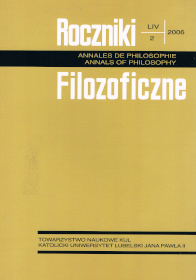Philosophical Choice between Indifference Principle and Fine-Tuning Principle
Abstract
We formulate a cosmogonic indifference principle in cosmology in terms of a dynamical system theory. While the choice between generic and fine tuned initial condition for our Universe has a rather philosophical character, there is a very generic set of initial conditions which give rise to the concordance inflectional ΛCDM model which becomes in good agreement with astronomical observations.
References
Amendola L., Tocchini-Valentini D. (2001): Stationary dark energy: the present universe as a global attractor, „Physical Review D” nr 64, s. 043509.
Arnold W. I. (1975): Równania różniczkowe zwyczajne, PWN, Warszawa.
Astier P., et al. (2006): The Supernova Legacy Survey: Measurement of Omega_M, Omega_Lambda and w from the First Year Data Set, „Astron. Astrophys.” Nr 447, s. 31-48.
Bojowald M. (2001a): Absence of a Singularity in Loop Quantum Cosmology, ”Phys. Rev. Lett.” Nr 86, s. 5227-5230.
Bojowald M. (2001b): Dynamical Initial Conditions in Quantum Cosmology, „Phys. Rev. Lett.” nr 87, s. 121301.
Bojowald M. (2002): Inflation from Quantum Geometry, „Phys. Rev. Lett.” Nr 89, s. 261301.
Davies P. C. W. (2004), Does quantum mechanics play a non-trivial role in life?, „Biosystems” Nr 78, s. 69-79.
Davies P. C. W. (2003): The origin of life, Pengin, London.
Dąbek D. (2004): Edwarda Milne’a ujęcie zasady kosmologicznej, „Roczniki Filozoficzne” 42, nr 1, s.163-181.
Demiański M. (1991): Astrofizyka Relatywistyczna, PWN, Warszawa.
Dodelson S. (2003): Modern Cosmology, Academic Press, San Diego.
Ehlers J., Rindler W (1989): MNRAS, 238, 503.
Ellis G. F. R. (1999): 83 years of general relativity and cosmology: progress and problems, „Class. Quantum Grav.” 16, s. A37-A75.
Fox S. W, Dose K. (1977): Molecular Evolution and the Origin of Life, Marcel Dekker, New York.
Guth A. H. (1981): Inflationary universe: A possible solution to the horizon and flatness problems, „Physical Review D” Nr 23, s. 347-356.
Holton G. (1981): Thematic Presuppositions and the Direction of Scientific Advance, [w:] A. F. Heath (red.), Scientific Explanation, Clarendon Press, Oxford.
Kane G. L., Perry M. J., Żytkow A. N. (2002): The Beginning of the End of The Anthropic Principle, „New Astronomy” Nr 7 (1), s. 45-53.
Losee J. (2001): Wprowadzenie do filozofii nauki, Prószyński i S-ka, Warszawa.
McMullin E. (1992): The Inference that makes Science, Milwaukee, Marquette University Press.
McMullin E. (1993): Indifference Principle and Anthropic Principle in Cosmology, „Studies in History and Philosophy of Science” Nr 24359, s. 389.
Misner C. W. (1969): Mixmaster Universe, „Physical. Review Letters” Nr 22, s. 1071-1074.
Riess A. G. et al. (1998): Observational evidence from supernovae for an accelerating Universe and a cosmological con-stant, „Astrophysical Journal” Nr 116, s. 1009-1038.
Stoeger W. R., Ellis G. F. R., Kirchner U. (2004): Multiverses and Cosmology: Philosophical Issues, arXiv: astr-ph/0407329.
Copyright (c) 2006 Roczniki Filozoficzne

This work is licensed under a Creative Commons Attribution-NonCommercial-NoDerivatives 4.0 International License.





